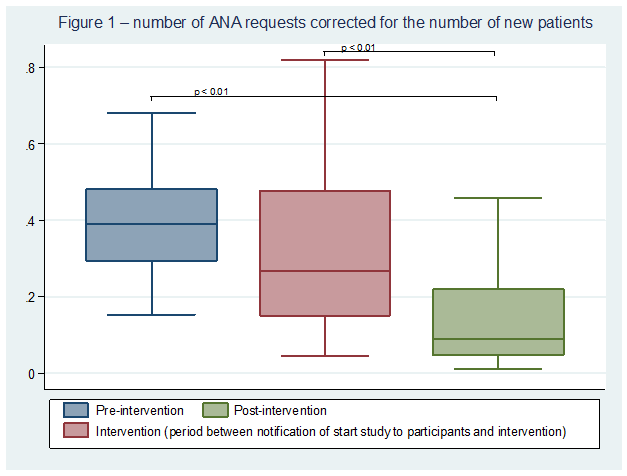Background/Purpose:
Anti-Nuclear Antibodies (ANA) are found both in patients with (non-)rheumatic diseases and in healthy controls1. ANA testing is useful in the diagnostic process of Systemic Lupus Erythematodus (SLE), Systemic Sclerosis (SSc), Mixed Connective Tissue Disease (MCTD), Sjögren Syndrome (SS), Polymyositis (PM) and dermatomyositis (DM)1,2. Laboratory tests in general, are often used inappropriate which leads mainly to overuse of tests.3 This was recently recognized by the American College of Rheumatology and the ANA is now included in the top 5 list of ‘things physicians and patients should question’.4 Therefore we aimed to assess the characteristics of ANA testing by rheumatologists in patients visiting the rheumatology outpatient clinic of the Sint Maartenskliniek (SMK) and Maartenskliniek Woerden (MKW), the Netherlands, before and after a targeted educational intervention.
Results:
All rheumatologists working in both the pre- and post-intervention period at the outpatient clinic participated (n=20). The characteristics of the ANA tests they ordered pre- and post-intervention are summarized in table 1. At both locations a large decrease in the number of ANA tests was seen after the intervention; when corrected for number of new patients seen the decrease was 77% (figure 1).
References
1Solomon DH et al. Arthritis Rheum 2002.2Colglazier CL et al. South Med J 2005. 3van Walraven C et al. JAMA 1998. 4Yazdany J. Arthritis Care Res 2013.
Disclosure:
N. Lesuis,
None;
E. Piek,
None;
H. Demirel,
None;
R. F. van Vollenhoven,
None;
A. A. den Broeder,
None.
« Back to 2013 ACR/ARHP Annual Meeting
ACR Meeting Abstracts - https://acrabstracts.org/abstract/less-is-more-a-targeted-intervention-results-in-substantial-improvement-in-rheumatologists-ordering-of-anti-nuclear-antibodies-ana-in-patients-with-rheumatic-complaints/


